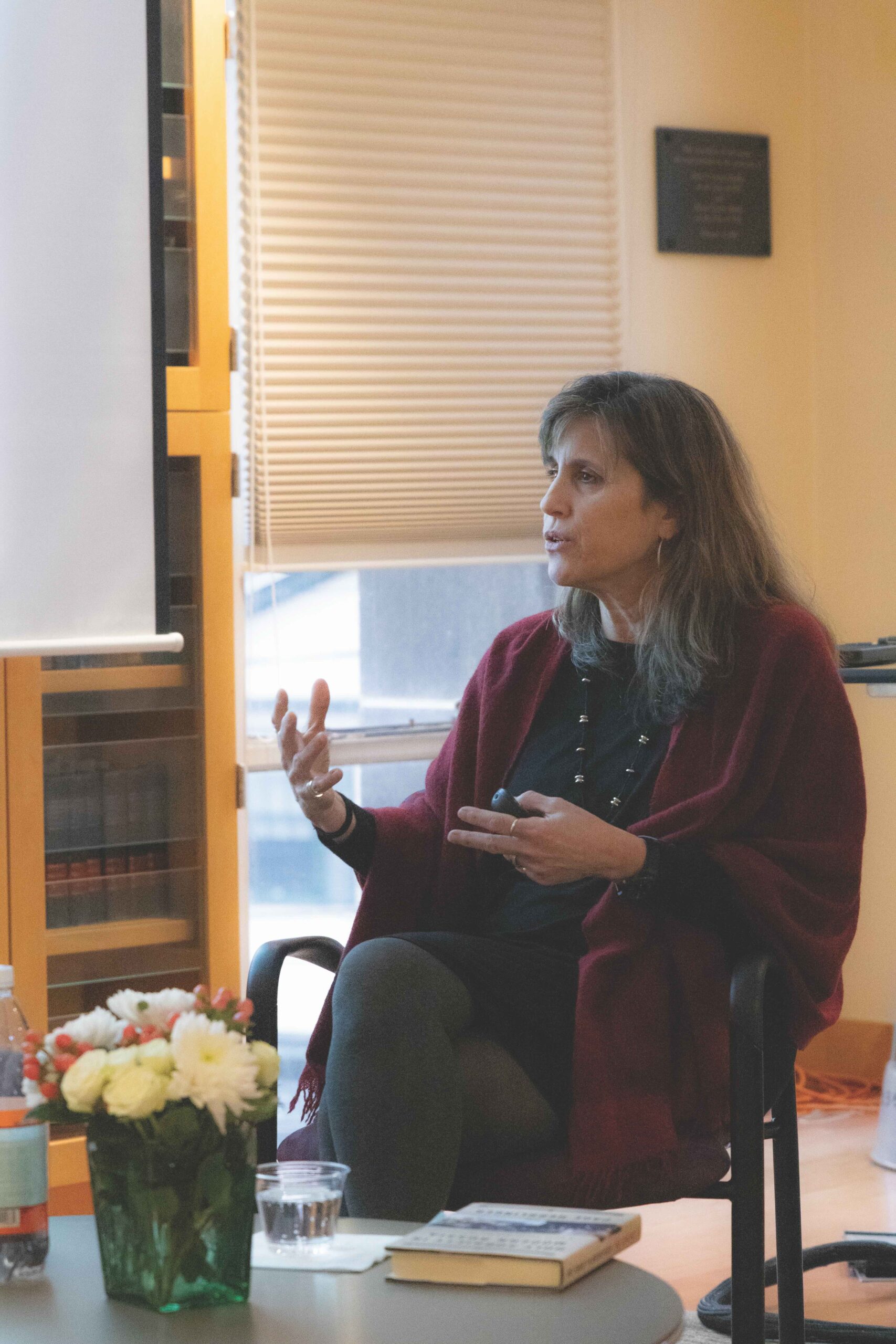High Sobriety: Professor Herrlinger discusses new book on Russian spiritual healer
March 29, 2024
 Riley Nelson
Riley NelsonOn Thursday afternoon, the Nixon Lounge of Hawthorne-Longfellow Library hosted a launch event for Professor of History Page Herrlinger’s new book, “Holy Sobriety in Modern Russia: A Faith Healer and His Followers,” which tells the story of “Brother Ioann” Churikov, a sectarian religious leader in St. Petersburg.
Churikov, who had amassed over 100,000 followers around the time of the Russian Revolution, was renowned among the residents of St. Petersburg for his natural charisma, his powerful gaze and his ability to cure a variety of illnesses—namely, alcoholism—using prayer and scripture. Herrlinger’s work focuses on his remarkable popularity, his persecution by the Russian Orthodox church and the Bolsheviks and his loyal following—who still continue worshiping him today.
Following a brief introduction by Humanities and Media Librarian Carmen Greenlee, Senior Lecturer in Russian, Eastern European, and Eurasian Studies Reed Johnson engaged Herrlinger in a conversation about her work before opening up the event to audience questions.
For Herrlinger, the completion of this book represents not only the end of a years-long academic process, but the culmination of a lifelong interest in Russia that propelled her to become an academic in the first place.
“Growing up in the Cold War, back in the ’70s and ’80s, I was always fascinated by the Soviet Union …. I was really struck by how little Americans knew about the Russian people. They were always [portrayed as just] the victims [of the communist regime],” she said. “Unfortunately, we know that there’s still a lot of repression and persecution, even today, but I really wanted to peel back the curtain and really learn more about the people—that’s why I went to graduate school.”
Along with Herrlinger’s first book, “Working Souls: Russian Orthodoxy and Factory Labor in St. Petersburg, 1880-1917,” which was published in 2007, “Holy Sobriety in Modern Russia” aims to add a new dimension to the way that 20th-century Russian history is told.
“I am trying to … find a way to integrate people’s religious lives into what has been traditionally a very secular account of the 20th century. The Soviet Union, they’re militant atheists, but people didn’t stop believing in God. Some people did, but not everybody,” Herrlinger said. “I’m not only interested in telling their stories, but also in showing the ways in which the secular and the religious—or the secular and the spiritual—were in constant dialogue with each other.”
According to Herrlinger, the writing of this book posed a unique set of historiographical challenges. While Churikov’s present-day followers assisted in accessing materials for her research, the inclusion of live interviews as part of her archive was a new experience. Additionally, Herrlinger’s desire to offer a complete history of Churikov required bridging two different disciplines.
“It’s partly a field question too … in the sense that most people are either trained as religious historians or as secular historians. I’ve worked hard to be both, to straddle both sides, and again, to see how they inform each other,” Herrlinger said.
As many audience members were Bowdoin professors, there was a shared appreciation of the quality of Herrlinger’s work. Much of the Q&A section was devoted to questions about her research techniques and comments praising her achievement. Visiting Lecturer in Russian, Eastern European, and Eurasian Studies Mira Nikolova highlighted the immense amount of work that “Holy Sobriety in Modern Russia” represents.
“It’s a fascinating topic, and as a scholar, I have so much admiration for the work that Professor Herrlinger has done. Just knowing what that looks like behind the scenes—it’s just so much effort,” Nikolova said.
Nikolova also praised how effectively Johnson and Herrlinger presented the book’s content before the audience.
“It’s a fascinating archival exploration [to me as an academic], but also as an audience member, it was such an engaging talk—I appreciated that. Just seeing the different members of the audience: you have people from the community, junior scholars in different fields—everyone was just so drawn in by the topic,” she said.
Eric Degodny ’24, one of Herrlinger’s students, also mentioned how interested he was in the content of “Holy Sobriety in Modern Russia,” and how much he enjoyed the event in general.
“I wanted to learn more about her scholarship and what she had been researching for such a long time. I think what interests me is how [Churikov’s] legacy was able to live on throughout a very repressive regime. Throughout the tsarist period; the communist, totalitarian period; to now the Putin period, he’s still able to be a [relevant religious figure],” Degodny said. “I wish I’d gone to more [faculty book launches].”
Throughout the event, Herrlinger expressed her gratitude for the opportunity to host a book launch at Bowdoin.
“As anyone who’s written a book knows, it’s an incredibly exciting thing to be able to launch it out into the world …. The production of these books takes quite a long time,” she said. “It’s a privilege to be able to share this with the community.”

Comments
Before submitting a comment, please review our comment policy. Some key points from the policy: